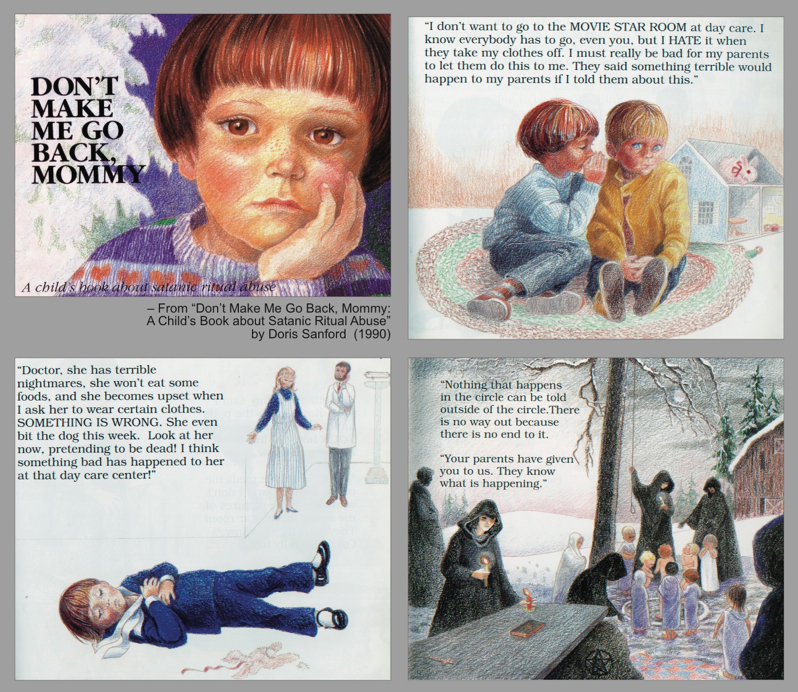Rascals case in brief
In the beginning, in 1989, more than 90 children at the Little Rascals Day Care Center in Edenton, North Carolina, accused a total of 20 adults with 429 instances of sexual abuse over a three-year period. It may have all begun with one parent’s complaint about punishment given her child.
Among the alleged perpetrators: the sheriff and mayor. But prosecutors would charge only Robin Byrum, Darlene Harris, Elizabeth “Betsy” Kelly, Robert “Bob” Kelly, Willard Scott Privott, Shelley Stone and Dawn Wilson – the Edenton 7.
Along with sodomy and beatings, allegations included a baby killed with a handgun, a child being hung upside down from a tree and being set on fire and countless other fantastic incidents involving spaceships, hot air balloons, pirate ships and trained sharks.
By the time prosecutors dropped the last charges in 1997, Little Rascals had become North Carolina’s longest and most costly criminal trial. Prosecutors kept defendants jailed in hopes at least one would turn against their supposed co-conspirators. Remarkably, none did. Another shameful record: Five defendants had to wait longer to face their accusers in court than anyone else in North Carolina history.
Between 1991 and 1997, Ofra Bikel produced three extraordinary episodes on the Little Rascals case for the PBS series “Frontline.” Although “Innocence Lost” did not deter prosecutors, it exposed their tactics and fostered nationwide skepticism and dismay.
With each passing year, the absurdity of the Little Rascals charges has become more obvious. But no admission of error has ever come from prosecutors, police, interviewers or parents. This site is devoted to the issues raised by this case.
On Facebook
Click for earlier Facebook posts archived on this site
Click to go to
Today’s random selection from the Little Rascals Day Care archives….
Click for earlier Facebook posts archived on this site
Click to go to
Today’s random selection from the Little Rascals Day Care archives….
A children’s book not appropriate for children

Nov. 5, 2012
“When five-year-old Allison’s parents begin to see a change in her behavior at home, they seek professional help for her. They find that Allison and other children have been ritually abused at a day care center. Thus begins Allison’s recovery….”
– From “Don’t Make Me Go Back, Mommy: A Child’s Book about Satanic Ritual Abuse” by Doris Sanford (1990)
Who knows how many lucky youngsters found this colorfully illustrated hardback under the Christmas tree? (More than 7,000 copies made it into print.)
Although Sanford credits herself with “months of intensive research into the nature and practice of satanic ritual abuse,” her dedication to “Patti Hills, Survivor…. We honor you, Patti! ” suggests she relied heavily on a Portland, Oregon, therapist “who claims to be… a witness to human sacrifice” (Willamette Week, Oct. 22, 1997). Also consulting: Lauren Stratford, author of the discredited baby-breeder memoir “Satan’s Underground.”
In 1993, “Don’t Make Me Go Back, Mommy” helped advance a notorious ritual-abuse case against a Spring Valley, Calif., child-care volunteer. The mother of one of Dale Akiki’s supposed victims admitted under cross-examination that she had read the book to her daughter, and it likely made the rounds of other parents. (After more than two years behind bars and a seven-month trial, Akiki was found not guilty of all charges.)
Eventually, however, “Don’t Make Me Go Back, Mommy” would become a target of appropriate (and sometimes hilarious) ridicule.
Privott’s allies found way around $1 million bail
 Feb. 3, 2012
Feb. 3, 2012
Glenn Lancaster, a Raleigh pay-phone executive, played a key part in facilitating life-after-incarceration for both Bob Kelly and Scott Privott.
I asked Glenn to recall how he became involved in the Little Rascals case:
“I had lived in Windsor, about 20 miles west of Edenton. I knew some of the Little Rascals parents but none of the Edenton Seven.
“I hadn’t paid that much attention to the case, but the truth seemed pretty clear, especially when the prosecution couldn’t persuade even one of the seven to turn state’s evidence.
“After I moved to Cary, I saw a story about Scott in the News & Observer (in 1993). He had been in (the Chowan County) jail for more than three years with no trial in sight and a $1 million bond.
“I wrote Scott offering to send him magazines and to cover some gas money for his wife to visit, as she had moved to the Outer Banks. He put me in touch with a lady in Edenton, who told me about other supporters.
“I called Scott’s attorney and asked why he hadn’t tried to lower the bail. I told him we could cover $50,000 and I would give Scott a job and a place to live.
“When the attorney asked the judge to reduce the bond to $50,000, he agreed on the spot! Over the next few days, several people came to the Clerk of Courts office in Edenton and posted land and cash. One man from Washington, N.C., brought a $25,000 check. When it was all counted, they were still a few hundred dollars short. I was told the Clerk of Court reached into his own pocket and posted the difference.
“Everyone in the jail knew Scott was innocent, and as he left jail the staff shook his hand. Scott’s wife showed up to tell him she was now living with a UPS driver and he could not come to her home. A supporter loaded up a cardboard box of Scott’s jail property – 6 or 8 paperback books, a radio and the stack of clothes his wife had brought him – and delivered him to a hotel in Cary around 5 p.m. There I met and spoke to Scott for the first time.
“When we returned to the hotel two hours later to take him to dinner, he told me he had spent most of that time standing in the shower. It was the first time in over three years he could set his own temperature and shower as long as he chose.”
‘The right man’ was the wrong man? No way!
 March 19, 2012
March 19, 2012
In “The Folly of Fools: The Logic of Deceit and Self-Deception in Human Life” (2011), Robert Trivers briefly addresses the causes and costs of the ritual abuse mania.
I asked Trivers, professor of anthropology and biological sciences at Rutgers University, about the role played by prosecutors in such cases:
“Prosecutors are notoriously vulnerable to tunnel vision – i.e., once a suspect has been identified, others disappear from sight; they also need to justify themselves in retrospect.
“I was told by (Innocence Project cofounder Peter J.) Neufeld that even after incontrovertible DNA evidence, 75 percent of the original detectives who came up with (and helped convict) the wrong person still say they believe they got ‘the right man.’ ”
‘The most fundamental questions of fairness’
July 5, 2013
“RALEIGH – During a hearing at the state Court of Appeals, Chief Judge Gerald Arnold repeatedly asked a state prosecutor about the fairness of testimony by (Bob) Kelly’s former attorney in Edenton. Arnold said the attorney had, in effect, testified that he believed in Kelly’s innocence until he learned his child had been abused.
“ ‘How can you argue that it was not extremely prejudicial?’ the judge asked.
“Associate Attorney General Ellen Scouten argued that Chris Bean did not divulge confidential information and did not violate an attorney-client relationship with Kelly. She said Bean testified as a parent and a crime victim.
“Arnold said Bean, now a district court judge, had gone beyond describing what he had seen and witnessed as a parent.
“ ‘This boils down to the most fundamental questions of fairness,’ Arnold said. ‘When you have an attorney testifying that “I was Mr. Kelly’s attorney and I believed in him very strongly until I learned the truth, that is to say that he’s guilty, and then I was shattered.” How can there be more prejudicial, stronger evidence put before a jury than to have a former attorney, the defendant’s attorney say that?’
“Scouten said that because the defense had contended that accusers in Edenton were hysterical people on a witch hunt it was fair to allow the state to show the type of people involved.
“ ‘Mr. Bean and his wife were reputable, respected thoughtful, educated people – not the type of people that would be swept up by community hysteria,’ she said.”
– From “Appeal of 2 defendants in Little Rascals case draws a crowd” in the News & Observer (Jan. 10, 1995)
Given this line of questioning, it came as no great surprise when four months later the Court of Appeals overturned the convictions of both Kelly and Dawn Wilson.
Bean’s unfettered opinionating was only one of three major defects cited by the court, the others being the withholding of exculpatory evidence by prosecutors and the testimony of parents as expert witnesses.
The prosecution got off light – the brief filed by appellate defender Mark Montgomery claimed no fewer than 222 potentially reversible errors.











0 CommentsComment on Facebook